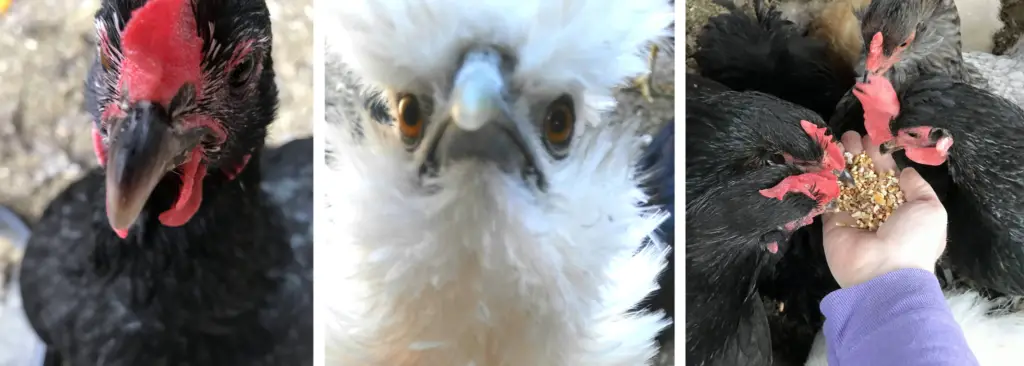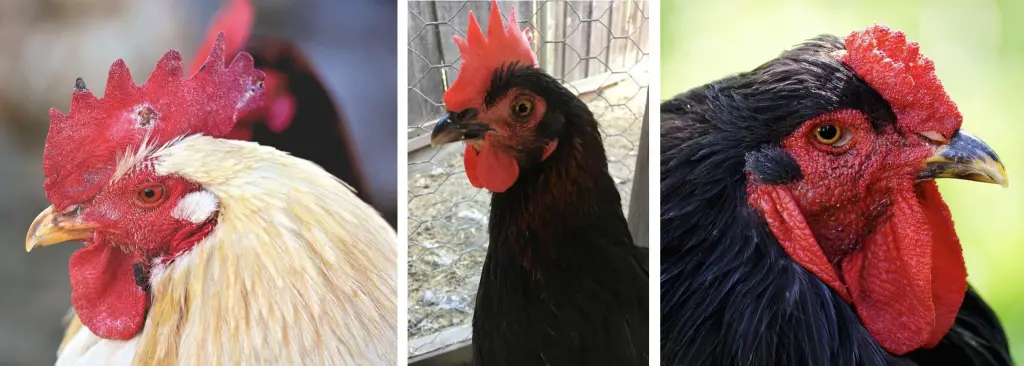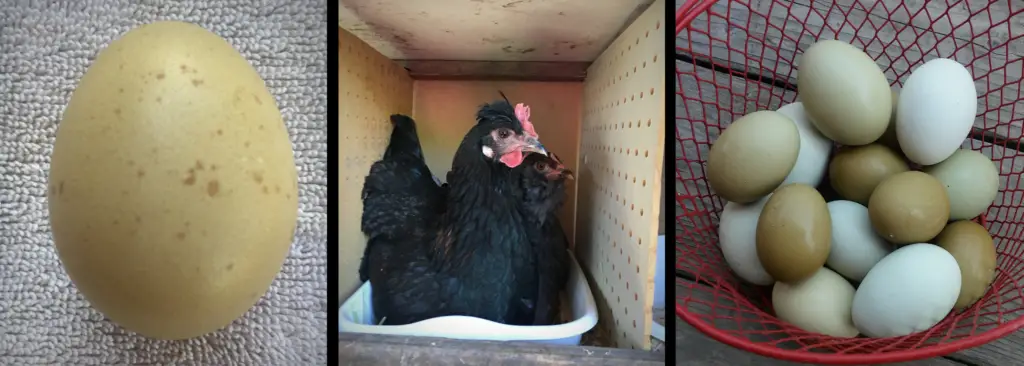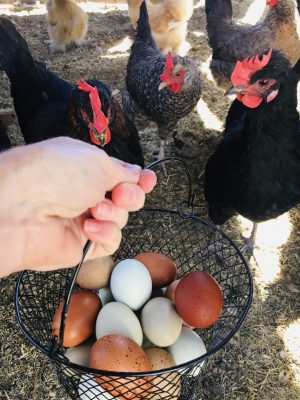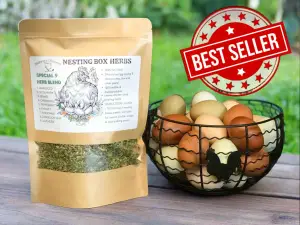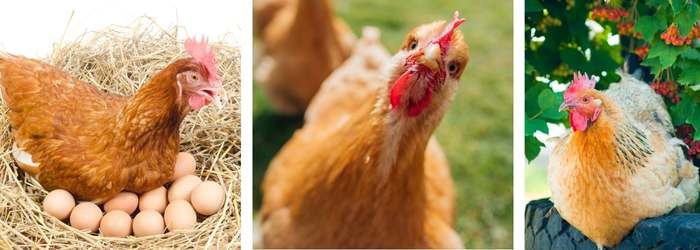
Are Your Chickens Happy and Healthy? Did you know that you can tell a lot about your chickens, just by looking at them? Your chicken is communicating to you in many different ways. There are several indicators to look for and things that you can do to ensure the health, happiness and well-being of your flock.
Happy, healthy chickens will produce the optimum amount of eggs! So, it’s important to make sure that you raise happy and healthy chickens.
Behavior of a Happy & Healthy Chicken
Chickens are social by nature. A happy and healthy chicken likes to perform its natural “chicken behavior” in groups.
What is “Natural Chicken Behavior?”
| WHAT IS NATURAL CHICKEN BEHAVIOR? |
|---|
| Daily and frequent preening (especially in groups) |
| Dustbathing (often in groups) |
| Pecking and scratching the ground, foraging for food (often in groups) |
| Eating and drinking with the rest of the flock |
| Moving about freely (is not off on its own for long periods of time) |
| Is vocal, often “purring” or making a higher pitch, throaty type vibration. |
| Hens will “sing” and roosters will crow. |
| Roosting with flock members (provide lower perches for smaller breeds, such as Silkies) |
| Hens regularly lay eggs (even healthy chickens will stop laying during a molt or cold winter weather) |
Visual Signs of a Happy, Healthy & Productive Chicken
- Happy, healthy, productive hens will have a red comb and wattle.
- Healthy chickens should have an empty crop first thing in the morning, before they are fed.
- Happy and Healthy chickens should go to roost at night with a full crop.
- Hens that are producing eggs regularly are happy and healthy.
- Clear eyes and nose. There shouldn’t be any discharge coming from a chickens eyes nose or beak.
- It should have a clean backend, no pasty-butt.
How to Keep Your Chickens Happy, Healthy & Productive
1. Provide the Proper Feed for Your Chickens
This is an area of keeping chickens that you cannot skimp on. Providing improper feed can make your flock unhealthy and less productive. For optimum egg laying, chickens need to be fed a nutritionally balanced feed for their age.
Depending upon a chickens age, its calcium and protein requirements vary quite a bit. This is why they sell chicken feed as “chick starter,” which provides increased protein and “layers crumbles” or “layers pellets” which provides increased calcium.
Chickens can have “treats” such as various types of table scraps, but it should be fed in moderation and only after they have had their regular feed for the day.
A chicken will be happy eating treats all day, but it isn’t healthy for them and it will decrease egg production. Feeding the improper feed will also lead to all kinds of medical issues, including obesity, high blood pressure, heart attack and stroke.
2. Provide Enough Food and Water for Your Chickens
| #CHICKENS | HOW MUCH FEED/DAY | HOW MUCH WATER/DAY AVERAGE DAY/HOT DAY |
|---|---|---|
| 1 | 1/4 LB | 1 PINT (2 CUPS)/ 2 PINTS (4 CUPS) |
| 4 | 1 LB | 1/2 GALLON / 1 GALLON |
| 6 | 1 1/2 LBS | 3/4 GALLON/ 1.5 GALLONS |
| 8 | 2 LBS | 1 GALLON/ 2 GALLONS |
| 12 | 3 LBS | 1.5 GALLONS/ 3 GALLONS |
How much food do chickens need? An adult chicken needs to be provided with about 1/4lb of feed per day. Bantam chickens eat a little less and the larger breeds, such as the Giant Cochin and Orpingtons may eat a little bit more.
- 1/4 lb of layers pellets equals about 1/2 cup of feed per chicken. This should be provided daily.
How much water do chickens need? The average adult chicken drinks about 1 liter of water per day. This can vary depending upon the size of the chicken and the outdoor environment. On very hot days a chicken may drink twice as much water.
- Chickens need to be provided with an unlimited amount of fresh, cool water daily.
- Provide more than one source of water for your flock. This is especially important if you have a large flock.
- Replenish the water frequently and more frequently on hot days.
3. Provide Enough Space for Your Chickens
How much space do chickens need?
| #CHICKENS | MINIMUM SQ FT IN RUN | MINIMUM SQ FT IN COOP |
|---|---|---|
| 2 | 20 SQ FT or 5′ X 4′ | 4 SQ FT or 2′ x’2′ |
| 4 | 40 SQ FT or 10′ X 4′ | 8 SQ FT or 2′ x 4′ |
| 6 | 60 SQ FT or 10′ X 6′ | 12 SQ FT or 3′ x 4′ |
| 8 | 80 SQ FT or 10′ X 8′ | 16 SQ FT or 4′ x 4′ |
| 10 | 100 SQ FT or 10′ X 10′ | 20 SQ FT or 4′ x 5′ |
Outside Chicken Coop Space: Each adult chicken needs to be provided with a MINIMUM of 10 square feet of space outside of the chicken coop (in the chicken coop). Larger breeds should be provided with a little bit more and smaller breeds a little less.
Inside Chicken Coop space: Each chicken needs to be provided with a minimum of 2 square feet of space. Larger breeds should be provided with a little bit more and smaller breeds a little less.
Roosting Space for Chickens: Each adult chicken requires about 12″ of roosting space. Larger breeds should be provided with a little bit more and smaller breeds a little less.
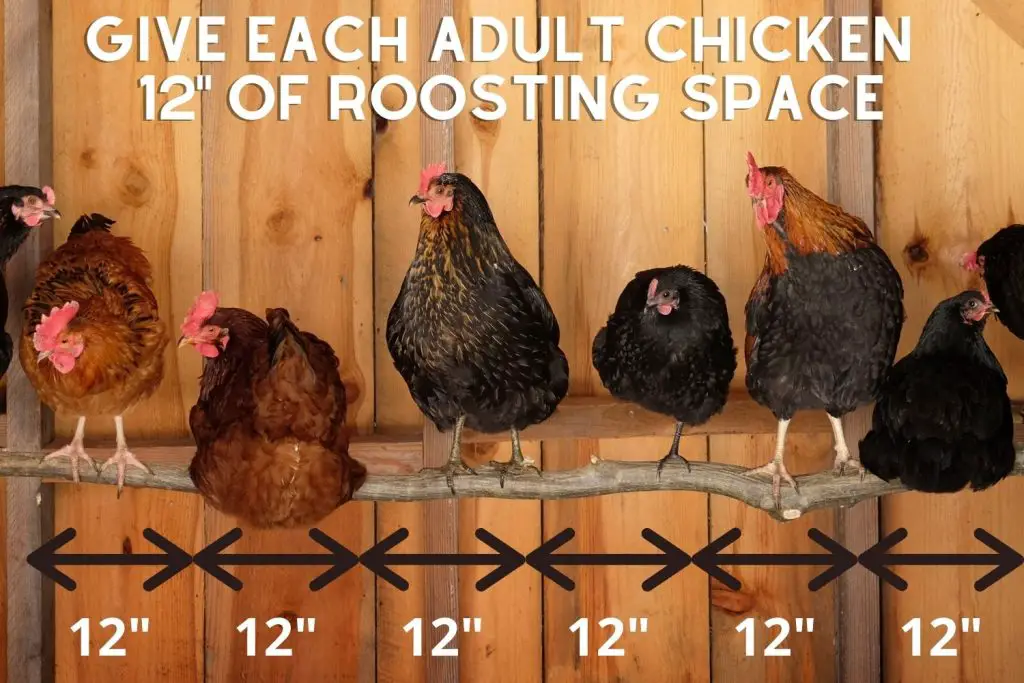
4. Eliminate Stress in Your Chickens Environment
Stressors of any sort not only will make a chicken unhappy, but it will also lead to a drop in egg production and predispose them to developing health issues.
What are some triggers of stress in your chickens environment?
| WHAT CAUSES A CHICKEN TO BECOME STRESSED? |
|---|
| PREDATORS TERRORIZING CHICKENS AT NIGHT |
| PREDATOR HAD BEEN IN THE COOP |
| NOT ENOUGH FOOD OR WATER |
| EXTREME HEAT |
| BARKING DOG |
| KIDS CHASING CHICKENS |
| ILLNESS |
| CHANGE IN ENVIRONMENT (MOVING) |
| PARASITES(MITES,LICE) |
| OVERCROWDED CONDITIONS |
| UNSANITARY ENVIRONMENT (DIRTY CHICKEN COOP) |
| BULLY CHICKEN |
5. Provide a Clean Chicken Coop for Your Chickens
“To decrease the chance of spreading harmful bacteria, spores and viruses, get on a good coop cleaning maintenance schedule. Don’t let excessive droppings build up and if the coop floor gets wet, it’s time to change the bedding material. Bacteria thrive in warm, moist environments.“
Can Cleaning a Chicken Coop Make You Sick? (9 Tips)
Dirty chicken coops are more likely to also breed parasites, which are easily passed onto your chickens. Chickens that are infested with mites, lice, fleas or other parasites can be miserable and most often decrease or stop laying eggs all together.
If it is difficult to find the time to clean out your chicken coop, consider using the Deep Litter Method. Using the deep litter method, you will only have to do a thorough cleaning 1-2 times a year.
How to Use the Deep Litter Method in a Chicken Coop(Easy Cleaning!)
- Start with adding 4-6 inches of large flake pine shavings to your coop floor.
- Over time this will decompose as your chickens poop and turn the bedding.
- Over the next several months continuously add more bedding to maintain the 4-6 inch depth.
- You do not need to turn the bedding. Your chickens will do the work for you!
- Deep litter method generates heat. So it helps to keep the chickens warmer at night when they are roosting.
- Plan to clean the chicken coop in the Spring, when the weather begins to start warming up again.
6. Have the Proper Nesting Box Setup
Nesting Box Location: Hens like to lay eggs in an area that is dark and doesn’t have a lot of noise or foot traffic by it.
Nesting Box Size: The ideal nesting box size for the average size hen is 12″ x 12″, slightly bigger for larger breeds and smaller for the bantam breeds. You will notice that if you provide too large of a nesting box, more than one hen will try to lay at the same time in there. This can even happen if the nesting box is the right size. They are just like kids and all seem to want to lay in the same box and have a difficult time waiting for their turn!
| HEN SIZE | NESTING BOX SIZE |
|---|---|
| AVERAGE SIZE HENS | 12″ X 12″ |
| LARGER BREEDS: GIANT COCHINS, ORPINGTONS | 12″ X 14″ |
| BANTAM HENS | 12″ X 10″ |
Nesting Material: Hens prefer a nice soft, clean place to lay eggs. So, if you want to encourage your hens to lay, add pine shavings, straw or hay and make sure it stays clean at all times.
Number of Nesting Boxes: The general rule of thumb is to provide 1 nesting box for every 4-5 laying hens. It is a common practice for hens to have a favorite place to lay their eggs. Sometimes they will all squabble for the one in the nesting box to hurry up. Impatient hens will just pile up on top of each other and all lay at the same time!
| # LAYING HENS | # NESTING BOXES |
|---|---|
| 1-4 | 1  |
| 5-8 | 2  |
| 9-12 | 3    |
| 13-16 | 4     |
| 17-20 | 5      |
| 21-24 | 6       |
| 25-28 | 7        |
| 29-32 | 8         |
7. Provide Nesting Box Herbs to Boost Egg Production
Consider using natural herbs to help improve your flock health, happiness and egg production. They can be sprinkled into nesting boxes, chicken coops and in dust bathing areas.
| NESTING BOX HERB | EFFECT ON CHICKEN EGGS |
|---|---|
| 1. MARIGOLD | ⬆ EGG LAYING DEEPER ORANGE YOLKS ⬇ MONOUNSATURATED FAT ⬆ SATURATED FAT STRENGTHENS EGG SHELLS |
| 2. ROSEMARY | ⬆ EGG LAYING LARGER EGGS LARGER EGG YOLKS ⬇ TRIGLYCERIDES ⬇ LDL ⬆ HDL |
| 3. FENNEL | ⬆ EGG LAYING ⬇ TRIGLYCERIDES ⬇ CHOLESTEROL |
| 4. CHAMOMILE | ⬆ EGG LAYING ⬆ CALCIUM STRONGER EGG SHELLS |
| 5. PEPPERMINT | ⬆ EGG LAYING LARGER EGGS ⬇ CHOLESTEROL |
| 6. PARSLEY | ⬆ EGG LAYING THICKER EGG SHELLS HEALTHIER CHICKS |
| 7. MARJORAM | ⬆ EGG LAYING |
| 8. DANDELION LEAF | ⬆ EGG LAYING DEEP ORANGE YOLKS STRONGER EGG SHELLS |
| 9. LAVENDER | ⬆ EGG LAYING |
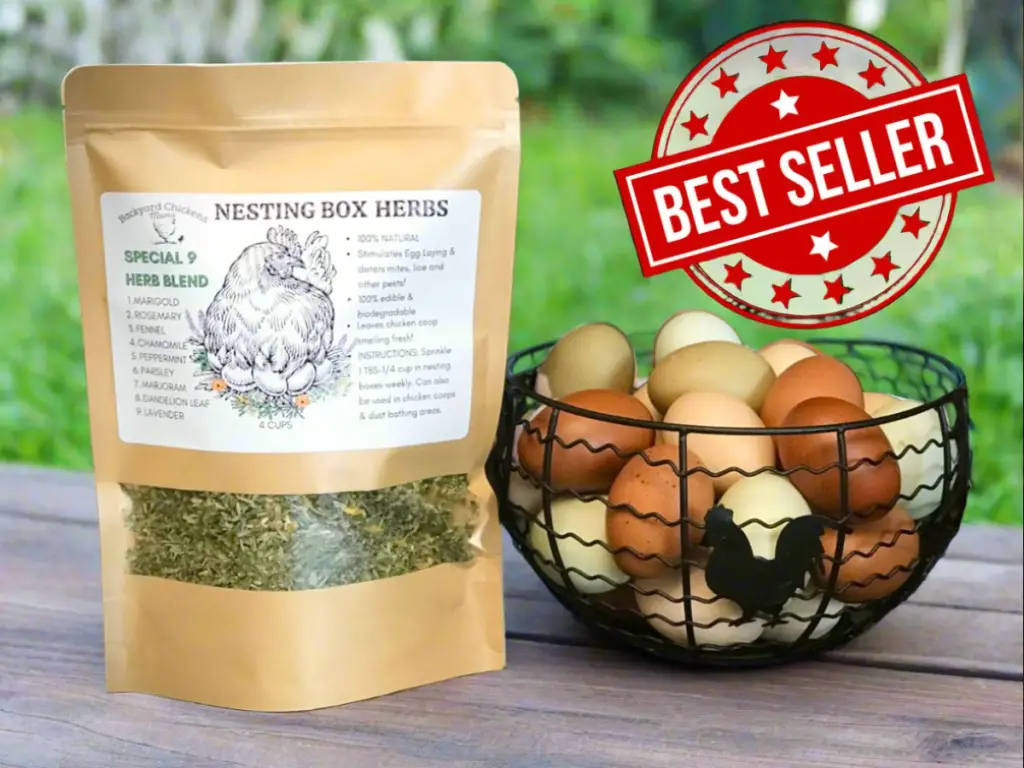
Increases egg laying naturally.
- Improves chicken health.
- Deters parasites: mites, lice, fleas & flies as well as mice, rats, raccoons, coyotes, opossums and more!
- On SALE!
- Shop: Nesting Box Herbs
CONCLUSION: How to Raise Happy, Healthy & Productive Chickens
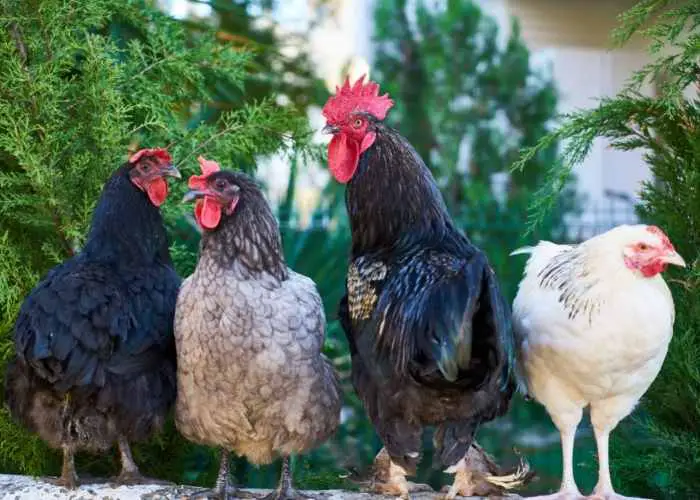
As a chicken owner, it is your responsibility to provide an environment that allows them to thrive. There are several things that you can begin doing right away.
- Provide a nutritionally balanced chicken feed for their age.
- Always allow them access to fresh, clean, cool water.
- Provide enough space for them to move around freely.
- Eliminate any stressors in your flocks environment(see the list above).
- Provide a clean and safe environment for your flock.
- Provide the proper number of nesting boxes that are the proper size and in a quiet, dark location.
- Use nesting box herbs to help improve your hens health, well-being and egg production.
By doing this, you are able to raise happy and healthy chickens. Happy and healthy chickens will reward you by providing you with an abundance of farm fresh eggs!

